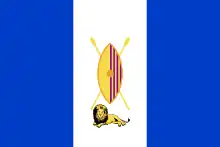| Ssekabaka Kato Kintu | |
|---|---|
| Kabaka of Buganda | |
| Reign | late 13th century |
| Predecessor | None |
| Successor | Chwa I of Buganda |
| Born | Uganda |
| Died | Mid-14th century Nnono, Busujju |
| Burial | Nnono, Busujju |
| Spouse | Nambi Nantuttululu |
| Father | Kagona |
| Mother | Namukana |
Kato Kintu Kakulukuku[1] (fl. Late 13th century)[2] known in Bunyoro as Kato Kimera was the first kabaka (king) of the Kingdom of Buganda. "Kintu" is an adopted by-name, chosen for Kintu, the name of the first person on earth in Buganda mythology. Kato Kintu gave himself the name "Kintu" to associate himself with the "father of all people",[3][4][5][6][7][8] and he may have renamed his wife, from Nantuttululu to Nambi, because that was Kintu's wife's name.[9]
Background and reign
Kintu was born at Bukasa Village, in the Ssese Islands, on Lake Nalubaale. He established his capital at Nnono, Busujju County. He fathered three children: Gguluddene, Ccwa (also spelt as Chwa) and Wakayima.[10]
- Prince (Omulangira) Mulanga
The final days
Kabaka Kato Kintu[11] died at age thirty. He was buried at Nnono, Busujju County.
Succession table
See also
References
- ↑ History of Buganda: From the Foundation of the Kingdom To 1900. CRC Press. 1972. pp. 35, 94, 95. ISBN 9780841901148.
- ↑ Shaping the Society Christianity and Culiture: Special Reference to the African Culture of Buganda. Author House. 2012. p. 94.
- ↑ "The Founding of Buganda". Buganda.com. Archived from the original on 11 November 2020. Retrieved 4 October 2014.
- ↑ The Kings of Buganda. East African Publishing House. 1971. p. 42. ISBN 9780800216337.
- ↑ The historical tradition of Busoga, Mukama and Kintu. Clarendon Press. 1972. pp. 86, 87, 88.
- ↑ Chronology, Migration, and Drought in Interlacustrine Africa. Africana Pub. Co. 1978. p. 150. ISBN 9780841903777.
- ↑ Afrique des Grands lacs. Zone Books. 2003. p. 113. ISBN 9781890951344.
- ↑ Myth, Ritual, and Kingship in Buganda. Oxford University Press. 1991. p. 95. ISBN 978-0-19-506436-0.
- ↑ Kizza, Immaculate N. (2010). The Oral Tradition of the Baganda of Uganda: A Study and Anthology of Legends, Myths, Epigrams and Folktales. McFarland. pp. 22–23. ISBN 9780786456055.
- ↑ Nsimbi, Michael B. (1980). Amannya Amaganda n'Ennono Zaago. p. 219.
- ↑ Dictionary of African Historical Biography, University of California Press, 1989, pp. 72, 109
External links
- List of The Kings of Buganda Archived 2013-06-15 at the Wayback Machine
